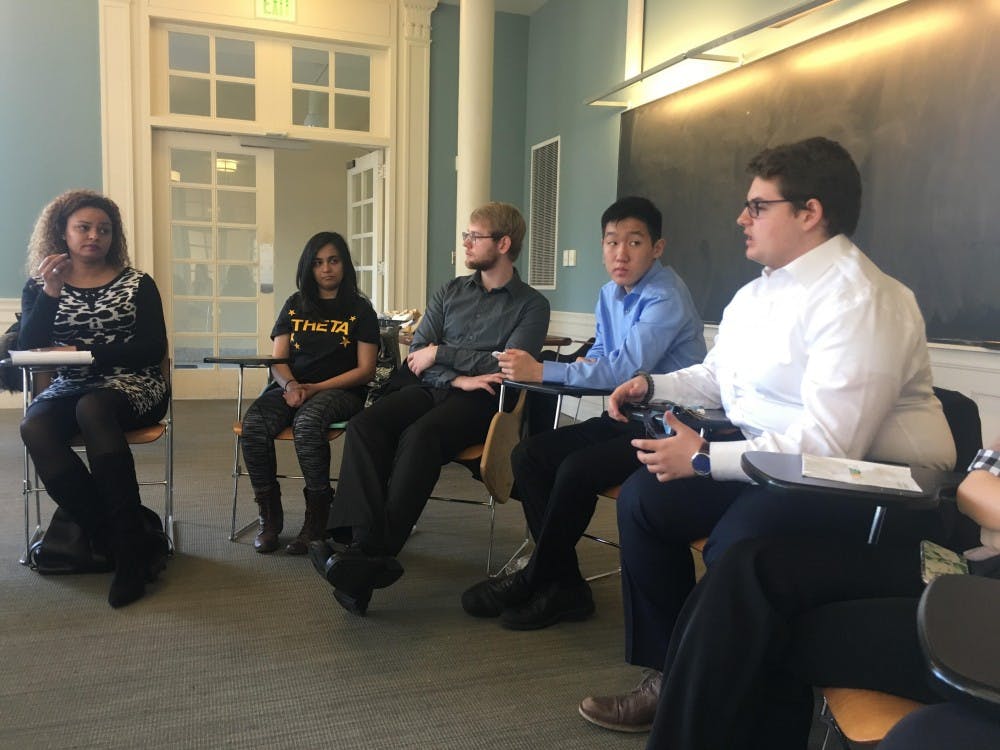The Policy Competition Team at Hopkins hosted a discussion about the state of Baltimore policing on Sunday. The organization invited Ganesha Martin, the former head of the Department of Justice Compliance, Accountability and External Affairs Division at the Baltimore Police Department (BPD), to answer questions.
Sophomore and co-founder Kevin Wu said that the Policy Competition Team at Hopkins was recently created to encourage critical thinking about current events and policy issues.
“Policy is everything,” Wu said. “It’s one thing to protest, but that doesn’t do anything until there are changes in policy.”
Sophomore and co-founder Meghna Kumar explained that there were not any existing policy clubs on campus.
“We want to provide [students] with networking opportunities and opportunities to compete,” she said.
The organization felt that bringing in Martin would help students further understand current changes occurring within the police department.
Martin initially served as Mayor Catherine Pugh’s special assistant and later went on to lead the Department of Justice Compliance, Accountability and External Affairs in the wake of the death of Freddie Gray.
“The Department of Justice... goes into a police department and sees if there is a practice of unconstitutional policing,” she said.
If the Department of Justice finds these practices, a judge puts forth a consent decree, which sets a list of policing reforms that must be put in place within the span of five years.
Some of the guidelines for the Baltimore consent decree included reforms to the community oversight task force and the use of force.
Martin worked to emphasize the idea that the police department needs to change its mentality toward arrests and for officers to recognize their own bias.
“If [officers] are being aggressive towards a person... [they] should question themselves and say ‘Is it my bias or is there something going on here?’” Martin said.
Martin attributed a lack of mental health resources as a significant cause behind police officer aggression. She said that before the consent decree, the only psychological facilities offered were those that determined if a police officer was fit to keep his or her job.
With the new reforms, officers are now offered anonymous therapy, which Martin believes will reduce unnecessary arrests.
She also stated that the basic mentality of the police department must change as well. She said that instead of asking officers how many guns they collected or how many people they arrested, police chiefs should ask community oriented questions.
“[For example] how many community members did you meet with?” Martin said.
Martin established a community outreach program to further establish trust between Baltimore City and their police department. She also mentioned the Baltimore Gun Trace Task Force, which was shut down because officers falsified information, robbed Baltimore citizens and committed other crimes.
“These were the guys who for the past 10 years... were robbing drug dealers,” Martin said. “These are people who never should have gotten a badge.”
Six members of the task force were found guilty at trial and are now serving time in prison.
Martin explained that because these officers acted in largely black communities, many victims felt too scared to speak against the police.
“We realized a lot of them should have been fired a long time ago,” she said.
Students asked for Martin’s thoughts on the proposed Hopkins police force. Many students expressed discomfort with the idea that there would be guns on campus, as well as with a police presence in general.
She said that it was important for University President Ronald J. Daniels to take student opinions into account.
“I think there is some sort of compromise,” she said.
Some students, including Kumar, feel it may be too late for a compromise.
“Hopkins has already released information about the police force,” she said. “There has already been a backlash from student groups.”
Martin, however, suggested that there is still room to work with students on the issue. She proposed integrating students into the process of privatized policing on campus.
“Why not let the students interview the officers before they’re hired?” Martin said.





